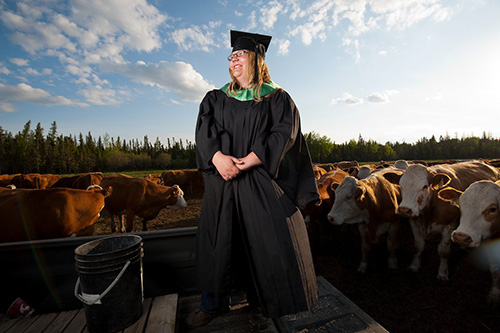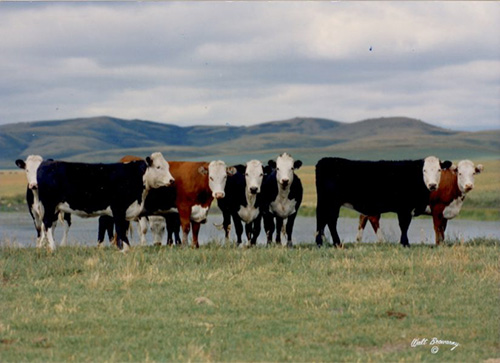BCRC-Hays Chair in Beef Production Systems
Investment in Beef Production Research Expertise
The University of Alberta's Faculty of Agricultural, Life and Environmental Sciences (ALES), the Beef Cattle Research Council (BCRC) and other beef industry partners are collaborating to strengthen local expertise dedicated to the sustainability and competitiveness of the Canadian beef industry. Specifically, the two organizations are pursuing the creation of a Research Chair in Beef Production Systems to increase the economic, environmental, and social sustainability of Canadian beef production.
While unique, this new position is highly complementary to existing beef cattle research at the UAlberta and across Canada. The aim is to build on local expertise to deliver practical applied research that combines genetic, forage, feed and management practices at the producer level, link it to new best practices and bolster management practices through the integration of new technologies.
An important outcome will be increased communication and technology transfer of beef cattle research at UAlberta to all industry stakeholders. Examples may include improved forage options that increases energetic efficiency, enhanced gut function reducing methane emissions (cow-burps), and/or selection for animals with enhanced health or resiliency resulting in less antibiotic use. Together, these would all help improve the economic sustainability of producers and environmental and social sustainability through lower greenhouse gas production and lower land, feed, water, and other resource use.
To ensure ongoing alignment between the Chair and the goals and objectives of the beef industry, the beef industry participated in the candidate selection process and will sit on an Industry Advisory Committee to consult on research, extension, and other strategic initiatives.
BCRC committed $1.5 million over 10 years towards the creation of this research chair, subject to UAlberta securing matching funds. The Hays family pledged $1 million, and additional contributions were made by Cargill and McDonald's Restaurants of Canada.
Contact Us
For more information on the project or to find out how to contribute- Cynthia Strawson cynthia.strawson@ualberta.ca / 780-492-2995
Key objectives and research focus for the Chair
- Increase the competitiveness of beef sectors most dependent upon grazing-based forage resources (cow/calf and backgrounding) with clear linkages through the finishing sector to maximize benefits throughout the beef value chain;
- Optimize practical economic benefits by linking beef genomic innovations with advances in the forage and feeds sectors (Livestock Gentec + Rangeland Research Institute);
- Focus on beef production and market outcomes across all Alberta climactic zones (prairie / parkland / boreal / mountain and foothills);
- Increase consumer confidence in the quality and sustainability Alberta beef;
- Develop an internationally-recognized research and extension program that continually improves the ability of producers to meet the needs of the cattle herd through effective use of grazing and forage lands;
- Reduce overwintering feed costs;
- Better align the seasonal forage supply with cattle nutritional needs;
- Investigate novel means of aligning the beef reproductive cycle with grazing practices with the aim of optimizing cow-reproduction rates and longevity;
Chair in Beef Production Systems Announcement
Announcement of the inaugural BCRC-Hays Chair in Beef Production Systems - May 4, 2021
Watch video
Background
UAlberta is already home to two internationally-recognized beef research resources (Livestock Gentec and the Rangeland Research Institute), spanning over 10,000 hectares of rangeland and 1,800 breeding cattle between the Mattheis Ranch (Duchess, AB) and the Roy Berg Kinsella Research Ranch (Kinsella, AB), which, in addition to housing the breeding cattle (Angus, Charolais, Composite, and Hays Converter herds) is home to the University's feedlot testing capabilities. Together, these provide a foundation to link existing animal-based research programs to beef cattle management practices and landscape level investigations of forage production, use and environmental sustainability services.
Livestock Gentec is an internationally-recognized leader in the genomic areas of beef feed efficiency, breed composition, hybrid vigour and cow/calf stayability, with a focus on DNA-based selection, sorting and management technologies that will form the basis of precision agriculture in beef.
The Rangeland Research Institute provides similarly-renowned expertise in feed, forage and pasture biodiversity, with an aim towards further drought-proofing pastures, developing over-yielding techniques* and improving northern forage and grazing systems, nutrient cycling, carbon storage, and greenhouse gas profiles.




